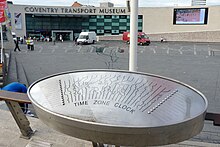
A time zone is a region that has a uniform standard time for legal, commercial, and social purposes. It is convenient for areas in close commercial or other communication to keep the same time, so time zones tend to follow the boundaries of countries and their subdivisions.
Most of the time zones on land are offset from Coordinated Universal Time (UTC) by a whole number of hours (UTC−12 to UTC+14), but a few are offset by 30 or 45 minutes (for example Nepal Standard Time is UTC +05:45). Some higher latitude countries use daylight saving time for part of the year, typically by changing ...